Home Tags Posts tagged with "vladimir putin"
vladimir putin
Russian activist Alexei Navalny has been freed from jail pending an appeal, a day after being sentenced to five years for embezzlement.
The court ruled that keeping Alexei Navalny in custody would deprive him of his right to stand in the mayoral elections in Moscow in September.
Thousands of Russians had protested against Alexei Navalny’s conviction, saying it was politically motivated.
Alexei Navalny, 37, is a vocal critic of President Vladimir Putin.
The elections in Moscow are set for September 8 and – for now at least – Alexei Navalny is being allowed to campaign.
On Thursday, Alexei Navalny was found guilty of heading a group that embezzled timber worth 16 million roubles ($500,000) from the Kirovles state timber company while working as an adviser to Kirov’s governor Nikita Belykh.
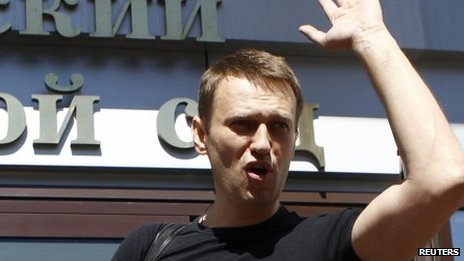
Alexei Navalny has been freed from jail pending an appeal, a day after being sentenced to five years for embezzlement
At the end of a three-hour verdict reading, Alexei Navalny was sentenced to five years in jail.
But on Friday, the Kirov regional court took just over an hour to hear the bail case and make its decision.
The three judges decided that, as Alexei Navalny had not breached his bail conditions during the trial, he should allowed to await the appeal decision at home in Moscow.
Alexei Navalny and his co-accused Pyotr Ofitserov were immediately released, and Navalny embraced his wife Yulia.
“I am very grateful to all the people who supported us, all the people who went to [protest on Moscow’s] Manezh Square and other squares,” he said.
It was not just the defense pleading Alexei Navalny’s case. In an unexpected move, prosecutors also pushed for him to remain free, with travel restrictions, pending his appeal.
Analysts said this could be an attempt by officials to soothe public anger over the case.
After the verdict on Thursday there were violent scuffles, as thousands of people took to the streets in Moscow, St Petersburg and other cities in protests that continued late into the evening. Reports said dozens were detained by police.
Other countries questioned the fairness of the verdict, with the EU saying it posed “serious questions” about the rule of law in Russia, while the US said it was “deeply disappointed”.
A spokesman for German Chancellor Angela Merkel said the trial had “raised doubts about whether criminal justice was the main motive”.
The Kremlin denies that Vladimir Putin uses courts for political ends, and the judge rejected Alexei Navalny’s claim that the trial was politically motivated.
Alexei Navalny is a leading campaigner against Vladimir Putin’s United Russia party and has regularly blogged about corruption allegations.
He came to public attention when he inspired mass protests against the Kremlin and President Vladimir Putin in December 2011.
Before he was led away to jail on Thursday, Alexei Navalny urged his supporters to continue his anti-corruption struggle, tweeting: “Don’t sit around doing nothing.”
[youtube WPZBQf64eas]
Russian activist Alexei Navalny has been jailed for five years, for embezzlement from a timber firm.
Protest leader Navalny, 37, had denied the charges, saying the trial was politically motivated.
He had been a leading campaigner against President Vladimir Putin’s United Russia party, and regularly blogged about corruption allegations.
The EU said the verdict posed “serious questions” about the state of Russian law. The US said it was “deeply disappointed”.
Before he was handcuffed and led away, Alexei Navalny urged his supporters to continue his anti-corruption struggle, tweeting: “Don’t sit around doing nothing.”
He has previously said he would like to stand for president one day.
Alexei Navalny had recently registered his candidacy for the next mayor of Moscow, but his campaign team said that after the verdict he was withdrawing from the race, and called on his supporters to boycott the vote.
Anti-Putin activist and former cabinet minister Boris Nemtsov told reporters the trial was “completely fabricated from start to finish, and even the judge could not say what the reason for the crime was”.
Other countries have also voiced their concern at the verdict. The US ambassador to Moscow, Michael McFaul, said: “We are deeply disappointed in the conviction of Navalny and the apparent political motivations in this trial.”
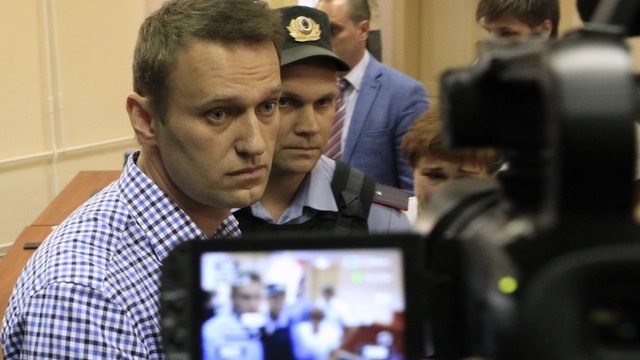
Alexei Navalny has been jailed for five years, for embezzlement from a timber firm.
A spokesperson for the EU’s top foreign policy official, Catherine Ashton, said the embezzlement charges were unsubstantiated, and that Alexei Navalny’s jailing posed “serious questions as to the state of the rule of law in Russia”.
French foreign ministry spokesman Philippe Lalliot added his concern, but said: “We note that not all judicial remedies have been exhausted and that the sentence could be reviewed on appeal.”
Alexei Navalny’s supporters in Moscow have vowed to stage protests against the verdict later on Thursday.
He arrived at the courtroom in Kirov to hear the verdict after a 12-hour overnight train journey from Moscow.
His wife, Yulia Navalnaya, said her husband knew he would get a non-suspended sentence and was mentally prepared to go to prison.
Alexei Navalny was found guilty of heading a group that embezzled timber worth 16 million rubles ($500,000) from the Kirovles state timber company while working as an adviser to Kirov’s governor Nikita Belykh.
The prosecution had asked for a six-year jail sentence, but judge Sergei Blinov decided on five years, and said there were no extenuating circumstances that would warrant keeping Alexei Navalny out of prison.
Alexei Navalny’s co-accused, Pyotr Ofitserov, was also found guilty, and given a four-year jail sentence.
“Navalny… committed a grave crime,” said Judge Sergei Blinov as he delivered the sentence.
State television has only shown limited interest in the process despite Alexei Navalny’s prominence, but online the trial has been followed extensively.
Alexei Navalny came to public attention when he inspired mass protests against the Kremlin and President Vladimir Putin in December 2011.
Judge Sergei Blinov said he found the testimony of the main prosecution witness, Vyacheslav Opalev, to be “trustworthy and consistent”.
Alexei Navalny insists that Vyacheslav Opalev spoke against him out of revenge, because Navalny had recommended he be fired and his company investigated for corruption.
After the verdict, Alexei Navalny tweeted: “So that’s it. Don’t get bored without me. Most importantly, don’t sit around doing nothing. The toad won’t get off the oil pipe by itself.”
In his LiveJournal blog on Wednesday Alexei Navalny said: “The current authorities are not a big, healthy fish, but rather a bloated fish or Latin American toad, which puffs itself up when it sees danger, with the help of television.”
In an unusual step, the court allowed the whole trial to be broadcast live online.
He is now one of the key figures of the opposition – a thorn in the side of the political establishment, campaigning against the endemic corruption.
Alexei Navalny has also coined a phrase to describe the ruling party United Russia that has stuck in everyone’s minds – “the party of crooks and thieves”.
[youtube lmqZZ_m2VmY]
Vladimir Putin dived to the bottom of the Baltic Sea in a mini submarine to explore a shipwreck.
The Russian president boarded an underwater research vessel to make the half-hour dive to the wreck of the frigate, Oleg, which sank in the Gulf of Finland in 1869.
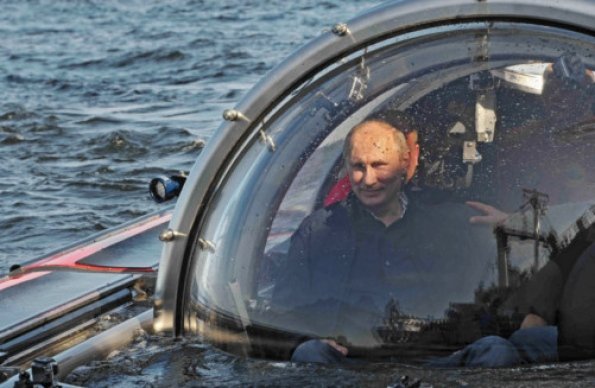
Vladimir Putin boarded an underwater research vessel to make the half-hour dive to the wreck of the frigate, Oleg, which sank in the Gulf of Finland in 1869
Vladimir Putin, who is fond of presenting himself to the people as a man of action, said the wreck, found in 2003, was well-preserved.
During the trip, Vladimir Putin also spoke about the fate of Edward Snowden, the former US spy agency contractor turned fugitive secrets leaker.
The president said that Edward Snowden was shifting towards stopping “political activity” directed against the United States. He had previously refused to hand Edward Snowden over to the US authorities, but said the fugitive’s situation remained unresolved after Washington had blocked his further movement.
Vladimir Putin said that Edward Snowden should stop activity harmful to the US if he wanted refuge in Russia, but now saw signs that the former contractor with the National Security Agency (NSA) was moving in this direction.
[youtube aI3Vn4bCUoA]
Edward Snowden has applied for temporary asylum in Russia, officials say.
The Federal Migration Service confirmed he had completed the relevant paperwork at Moscow’s Sheremetyevo airport, where he has been for the past three weeks.
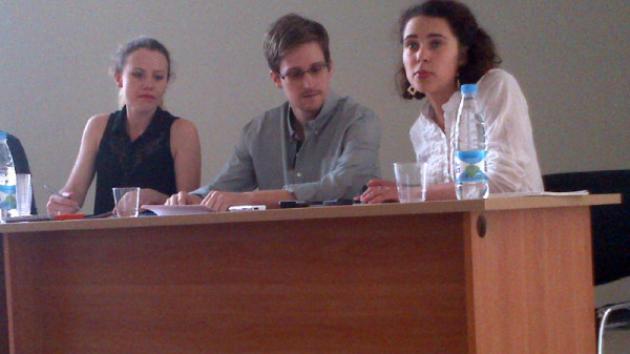
Edward Snowden has applied for temporary asylum in Russia
Whistleblower Edward Snowden, 30, is wanted by the US for leaking details of government surveillance programmes.
He has no travel documents, so he has been unable to take up asylum offers from a number of Latin American states.
Edward Snowden’s application for temporary asylum was completed with the help of Russian lawyer Anatoly Kucherena, who has strong links with the Kremlin.
Anatoly Kucherena said the fugitive had stated in the application that he faced possible torture and execution if he returned to the US.
According to Russian officials, Edward Snowden might be moved to a facility in the airport for accommodating refugees while his application was processed.
Russia’s President Vladimir Putin has refused to hand over Edward Snowden to the US authorities, but also said that he could only stay in Russia if he stopped leaking secrets about US surveillance schemes.
[youtube TUqUqmrAPyU]
President Vladimir Putin has said the US authorities have in effect trapped Edward Snowden in Russia.
Vladimir Putin said fugitive whistleblower Edward Snowden would leave if he was able to.
The 30-year-old former intelligence analyst has been offered asylum in a number of Latin American states, but has no documents with which to leave the transit zone at Moscow airport.
The US has charged Edward Snowden with leaking classified information.
Vladimir Putin has refused to hand over the fugitive to the US authorities, but says he can only stay in Russia if he stops leaking secrets about US surveillance schemes.
The Russian president said there were signs that Edward Snowden was “changing his position”.
However, he added that Edward Snowden did not want to stay in Russia but wanted to take up residence in “another country”.
Asked what Edward Snowden’s future was, the Russian president said: “How should I know? It’s his life.”
“He came to our territory without invitation. And we weren’t his final destination… But the moment he was in the air… our American partners, in fact, blocked his further flight,” Vladimir Putin said.
“They have spooked all the other countries, nobody wants to take him and in that way, in fact, they have themselves blocked him on our territory.”
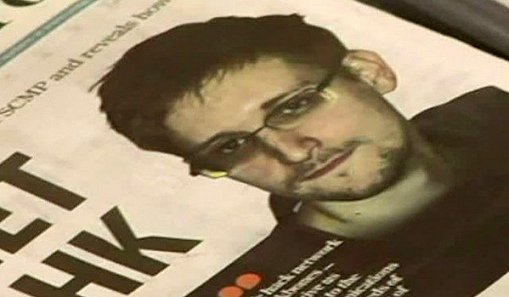
Edward Snowden has been stuck in the transit area of Sheremetyevo airport since arriving from Hong Kong in June
Edward Snowden has been stuck in the transit area of Sheremetyevo airport – reportedly staying at the airport’s Capsule Hotel – since arriving from Hong Kong on June 23.
The American has sent requests for political asylum to at least 21 countries, most of which have turned down his request.
However, Bolivia, Nicaragua and Venezuela have indicated they could take him in.
But Edward Snowden is unable to leave the transit zone without asylum documents, a valid passport or a Russian visa – he reportedly has none of these.
And some European countries are likely to close their airspace to any plane suspected of carrying the fugitive.
At a news conference on Friday, Edward Snowden said he was seeking temporary asylum in Russia before he could safely travel to Latin America. However, Moscow officials say they have so far received no such request.
Edward Snowden’s leaking of thousands of classified US intelligence documents has led to revelations that the National Security Agency (NSA) is systematically seizing vast amounts of phone and web data.
The documents have also indicated that both the UK and French intelligence agencies allegedly run similarly vast data collection operations, and the US has been eavesdropping on official EU communications.
[youtube LK8hAW5AhWM]
Venezuela emerged today as the country most likely to shelter NSA whistleblower Edward Snowden from US justice.
President Nicolás Maduro said he was “willing in principle” to grant Edward Snowden asylum, declaring: “He didn’t kill anyone or plant a bomb.”
Nicolás Maduro said that the NSA whistleblower had not made a formal application for refuge but that he deserved protection under international law.
But the Venezuelan president, who is in Russia on a state visit, batted down speculation that he could spirit the data analyst away to Venezuelan capital Caracas on his presidential jet when he leaves Russia tonight.
Edward Snowden, 30, has so far applied for asylum in 21 countries but faces a thinning list of options after Finland, India, Ecuador and Poland rejected his plea and a number of others said applications can only be made in person on their home soil.

President Nicolás Maduro said he was “willing in principle” to grant Edward Snowden asylum
In the most positive news yet for Edward Snowden, Nicolás Maduro said: “He did not kill anyone and he did not plant a bomb… He only said a big truth to prevent wars.”
His comments came after Edward Snowden has abandoned his bid for asylum in Russia, hours after president Vladimir Putin said he would only be welcome if he stopped leaking the secrets of “our American partners”.
WikiLeaks today revealed Edward Snowden has begged 21 countries to take him in as he fights extradition to the US where he faces charges of espionage after leaking top-secret documents on US surveillance schemes.
The list includes Austria, Bolivia, Brazil, Cuba, Finland, France, Spain, Germany and Ireland.
“Snowden really asked to remain in Russia,” Vladimir Putin’s spokesman, Dmitry Peskov, said.
“Learning yesterday of Russia’s position… he abandoned his intentions and his request to get the possibility to stay in Russia.”
Earlier, Vladimir Putin made it clear Russia would only consider his request if he stops “attacking our American partners” in an unusual gesture of solidarity with the US.
“Russia never hands over anybody anywhere and has no intention to do so,” said the Kremlin leader, defying a specific U.S. request.
“If he [Edward Snowden] wants to remain here there is one condition – he should stop his work aimed at inflicting damage on our American partners no matter how strange this may sound coming from me.”
[youtube xDxDqem_5I0]
Fugitive whistleblower Edward Snowden has applied to Russia for political asylum, Russian officials say.
Foreign ministry consul Kim Shevchenko said the request was made on Sunday night. The Kremlin has made no comment.
Edward Snowden, 30, is believed to be holed up in a Moscow airport hotel.
Earlier, President Vladimir Putin said Edward Snowden was welcome to stay as long as he stopped “inflicting damage on our American partners”.
The US has not yet made any comment on the latest developments.
President Barack Obama, speaking earlier in Tanzania, said Washington and Moscow had held “high level” discussions about Edward Snowden.
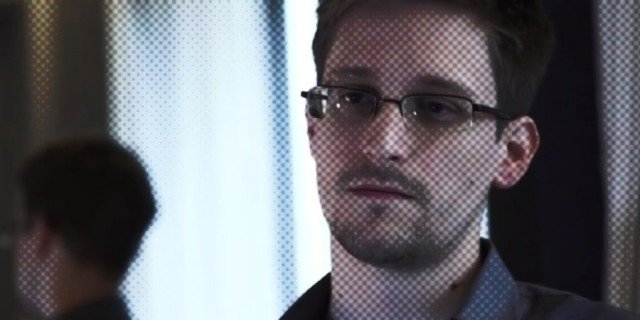
Fugitive whistleblower Edward Snowden has applied to Russia for political asylum
“We are hopeful the Russian government makes decisions based on the normal procedures regarding international travel and the normal interactions law enforcement have,” he told reporters, pointing out that Edward Snowden does not have a valid passport or legal papers.
According to Russia’s Interfax news agency, Edward Snowden’s application for asylum was handed to a consular official at Moscow’s Sheremetyevo Airport late on Sunday evening.
The application was delivered by Sarah Harrison, a member of the WikiLeaks legal team acting as Edward Snowden’s representative, Kim Shevchenko was quoted by the news agency saying.
Russia’s Federal Migration Service has denied the report, which appeared in the New York Times earlier.
Edward Snowden has reportedly been in the transit area of Sheremetyevo Airport since arriving there from Hong Kong on June 23.
He flew there soon after revealing himself to be the source behind the leaking of thousands of classified documents showing the extent of US email and telephone surveillance.
It was thought he had been seeking asylum in Ecuador, whose embassy in London is sheltering WikiLeaks founder Julian Assange who is also wanted by the US.
Edward Snowden faces charges of espionage in the US.
[youtube dts1rF7BIEA]
President Vladimir Putin has told fugitive Edward Snowden to stop leaking US secrets if he wants to remain in Russia.
Vladimir Putin said Moscow had never extradited anyone before and “has no intention to do so”, adding Edward Snowden was free to go if granted asylum elsewhere.
Edward Snowden, 30, is believed to be holed up in a Moscow airport hotel.
The US wants to prosecute him over the leaking of thousands of classified intelligence documents.
The leaks have led to revelations that the US is systematically seizing vast amounts of phone and web data.
This weekend, Germany’s Der Spiegel newspaper and Britain’s The Guardian newspaper publicized allegations that the US has been spying on its EU allies.
The revelations have angered many EU countries which are demanding a response from Washington.
France’s President Francois Hollande has warned that negotiations over a major EU-US trade deal planned for next week could be threatened unless Washington can guarantee the spying stops “immediately”.
“Russia never hands over anybody anywhere and has no intention to do so,” Vladimir Putin told a news conference in Moscow.
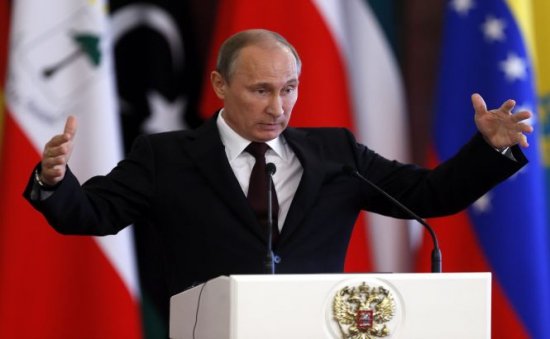
Vladimir Putin has told fugitive Edward Snowden to stop leaking US secrets if he wants to remain in Russia
“If he [Edward Snowden] wants to remain here there is one condition – he should stop his work aimed at inflicting damage on our American partners no matter how strange this may sound coming from me.”
It appears President Vladimir Putin is keen to avoid damaging relations with Washington over the Snowden case.
The Russian president also stressed Edward Snowden “is not our agent and does not co-operate with us”, and Russian secret services “never worked with him and are not working with him now”.
Earlier, senior Russian official Nikolai Patrushev said both President Vladimir Putin and his US counterpart, Barack Obama, had told the chiefs of their security services to seek a resolution to the stand-off over Edward Snowden.
Nikolai Patrushev, secretary of Russia’s Security Council, told Russian media that the FSB and the FBI had been told to “keep in contact and find solutions”, but warned there was no simple solution to the situation. The FBI refused to comment.
Vladimir Putin was speaking at the same time President Barack Obama confirmed to reporters that Washington had held “high level” discussions with Russia about Edward Snowden.
“We don’t have an extradition treaty with Russia,” he told reporters while on a visit to Tanzania.
“On the other hand, Mr. Snowden, we understand, has travelled there without a valid passport and legal papers. And we are hopeful the Russian government makes decisions based on the normal procedures regarding international travel and the normal interactions law enforcement have.”
[youtube 97i3Itb-QhI]
G8 leaders have agreed new measures to clamp down on money launderers, illegal tax evaders and corporate tax avoiders.
Governments agreed to give each other automatic access to information on their residents’ tax affairs.
They will also require shell companies – often used to exploit tax loopholes and invest money anonymously – to identify their effective owners.
The summit communiqué urged countries to “fight the scourge of tax evasion”.
The measures are designed to combat illegal evasion of taxes, as well as legal tax avoidance by large corporations that make use of loopholes and tax havens.
The summit in Northern Ireland also saw the launch of free trade negotiations between the EU and US, which UK Prime Minister David Cameron, who was hosting the summit, dubbed “the biggest bilateral trade agreement in history”.
Tax, trade and transparency – dubbed “The Three Ts” – were placed at the top of the UK’s agenda for its presidency of the G8, which consists of the UK, US, Germany, France, Italy, Russia, Canada and Japan.
But the summit has been overshadowed by the conflict in Syria.
The G8 leaders – including Russian President Vladimir Putin, an ally of Syrian leader Bashar al-Assad – backed calls for Syrian peace talks to be held in Geneva “as soon as possible”.
David Cameron said the leaders had managed “to overcome fundamental differences”, but no timetable for the Geneva talks was given, and the statement made no mention of what role Bashar al-Assad could play in the future.
Leaders agreed that multinationals should tell all tax authorities about what taxes they pay and where.
“Countries should change rules that let companies shift their profits across borders to avoid taxes,” the communiqué said.
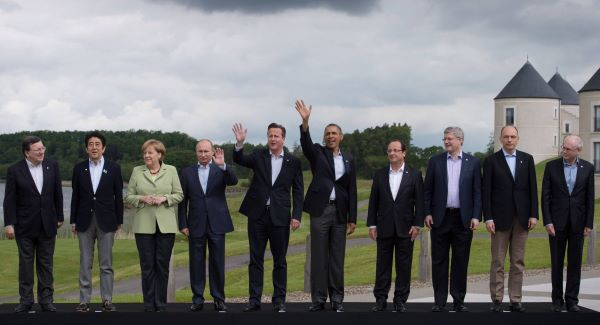
G8 leaders have agreed new measures to clamp down on money launderers, illegal tax evaders and corporate tax avoiders
It follows revelations about the ways in which several major firms – including Apple, Starbucks and Amazon – have minimized their tax bills.
Illegal activities, including tax evasion and money laundering, will be tackled by the automated sharing of tax information.
Ahead of the summit, the Organization for Economic Co-operation and Development (OECD), proposed to share tax information by building on an existing system set up by the US and five major European economies, but on a global scale.
“This international tax tool is going to be a real feature of ensuring that we get proper tax payment and proper tax justice in our world,” said David Cameron, who claimed that it meant “those who want to evade taxes have nowhere to hide”.
The OECD includes all of the G8 members except Russia.
Among the information to be shared will be who actually ultimately benefits from the shadowy shell companies, special purpose companies and trust arrangements often employed by tax evaders and money launderers.
Earlier in the day, Chancellor George Osborne unveiled plans for a UK register of companies and their owners.
The White House also announced a similar plan for the US.
Last week the UK also unveiled a deal with its crown dependencies and overseas territories – including the Channel Islands, Gibraltar and Anguilla – to start sharing more information on which foreign companies bank their profits there.
About a fifth of offshore tax havens, which are used by multinationals to shelter cash from the tax authorities, are British dependencies.
“Of course Britain’s got to put its own house in order,” said George Osborne, adding that the government would launch a consultation on whether the register should be published or just be available to the HMRC.
Speaking during the summit, George Osborne said more progress had been made on reforming the global tax system in the past 24 hours than the “past 24 years”.
The G8 communiqué also demanded more transparency from mining firms.
It follows revelations that many major mining companies use complex ownership structures in the Netherlands and Switzerland to avoid paying taxes on the minerals they extract in developing countries.
“Developing countries should have the information and capacity to collect the taxes owed them,” the communiqué said.
“Other countries have a duty to help them.”
The governments agreed that mining companies should disclose all the payments they make, and that “minerals should not be plundered from conflict zones”.
“We agreed that oil, gas and mining companies should report what they pay to governments, and that governments should publish what they receive, so that natural resources are a blessing and not a curse,” said David Cameron.
The G8 leaders also agreed to stamp out ransom payments to kidnappers for the release of hostages.
David Cameron said tens of millions of dollars in ransom money had been paid around the world in the last three years.
[youtube 6mgcf14DtYE]
Leaders at the G8 summit in Enniskillen, Northern Ireland, are close to signing a joint statement on Syria, despite their differences.
Russia and the US are backing opposite sides in the conflict, but officials say the statement could soon be agreed.
This could include the proposed peace conference in Geneva, and more access for deliveries of humanitarian aid.
The summit, which is now in its final day, is also discussing tax evasion and efforts to boost trade.
Russian Deputy Foreign Minister Sergei Ryabkov said Moscow would sign up to the statement on Syria later on Tuesday.
But he stressed the Kremlin wanted each of the Syrian sides in the talks to select not only their own delegations but the future terms of any transitional government.
Sergei Ryabkov sidestepped the question of whether this could leave open a role for President Bashar al-Assad in the future.
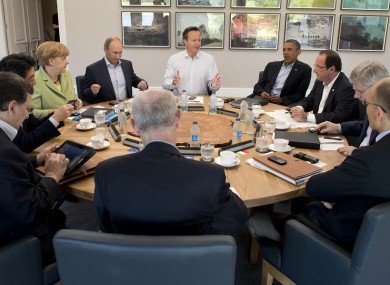
Leaders at the G8 summit in Enniskillen, Northern Ireland, are close to signing a joint statement on Syria, despite their differences
To try to get as much consensus as possible on Syria, UK Prime Minister David Cameron – who is hosting the summit – held a working dinner on Monday night.
The leaders were alone, with no officials present, allowing them to express their views frankly.
After the meeting, British officials appeared more optimistic that an agreement could be reached on the joint statement on Syria.
However, they said it would take more work to agree the precise language.
Earlier on Monday, the British had raised the possibility of the other G8 nations issuing an end-of-conference statement without the participation of Russia.
But it now seems that Vladimir Putin is willing to consider some kind of joint stance, according to officials.
The communiqué is likely to back the launch of Syrian peace negotiations in Geneva, and insist that humanitarian aid agencies like the Red Cross are given access to all parts of the country.
Any statement which emerges may not be all that ambitious, correspondents warn – and even then, it is far from certain that any agreement will change the appalling reality in Syria itself.
The White House announced last week that it would provide military aid to the Syrian rebels. Russia meanwhile supplies weapons to the government of President Bashar al-Assad.
Presidents Barack Obama and Vladimir Putin met for an hour of bilateral talks on Monday, and at a sombre press conference afterwards it was clear they had had a difficult exchange.
Both presidents acknowledged their differences but said they shared a common desire to stop the bloodshed.
[youtube m_ct4nozZaU]
Vladimir Putin has hit back at allegations he stole a diamond-encrusted Super Bowl ring from billionaire Robert Kraft, the owner of New England Patriots.
Robert Kraft claims the Russian president pocketed his $26,000 ring during a visit to St Petersburg back in 2005.
He has kept quiet about the incident for the past eight years, but broke his silence during a gala in New York at the weekend.
Robert Kraft says he meant to only show Vladimir Putin the ring, but the president pocketed it.
“He put it on and he goes, <<I can kill someone with this ring!>>” Robert Kraft said.
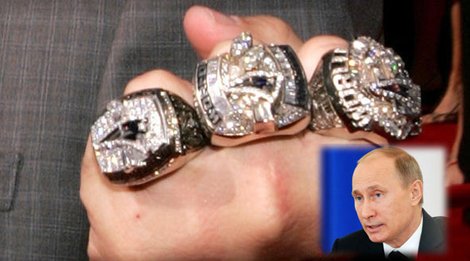
Vladimir Putin has hit back at allegations he stole a diamond-encrusted Super Bowl ring from billionaire Robert Kraft
“I put my hand out and he put it in his pocket. And three KGB guys got around him and walked out.”
The ring, which is encrusted with 124 diamonds that spell out the words “World Champions”, has turned up on display at the Kremlin Library.
But Dmitry Peskov, a spokesman for President Vladimir Putin, insists it was a gift.
“What Mr. Kraft is saying now is weird. I was standing 20 centimetres away from them, and I saw Mr. Kraft give this ring as a gift,” he said in a statement.
“If the gentleman is really experiencing such excruciating pain from his loss, the president is ready to send him any other ring he can buy for that kind of money.”
Dmitry Peskov has also suggested Robert Kraft should see a psychoanalyst.
“These words about how someone put pressure on him and so forth – I think this is an issue for a detailed discussion with psychoanalysts,” he said.
Robert Kraft says he tried to get the ring back in 2005, but was advised by the White House that it would be in the best interest of American-Russian relations if he dropped the matter.
His spokeswoman Stacey James says while Robert Kraft still has emotional ties to the ring, he is happy for it to remain in Moscow.
“It’s a humorous, anecdotal story that Robert retells for laughs,” she said.
“He loves that his ring is at the Kremlin and, as he stated back in 2005, he continues to have great respect for Russia and the leadership of president Putin.”
[youtube dJRhPcraj6s]
Presidents Barack Obama and Vladimir Putin have acknowledged at the G8 meeting in Northern Ireland that they have a different stance on Syria, but agreed to push for a summit in Geneva.
After face-to-face talks, Barack Obama and Vladimir Putin said they shared a common desire to end the violence.
Both also said they were optimistic on Iran, after its presidential election.
Earlier, the G8 nations discussed the global economy, with the leaders agreeing world prospects remained weak.
The G8 leaders are now heading to a working dinner, where Syria is likely to be top of the agenda.
Other nations joining the UK, US and Russia for the 39th Summit of the Group of Eight (G8) in Lough Erne, County Fermanagh, are Canada, France, Germany, Italy and Japan.
Vladimir Putin and Barack Obama met for about two hours on the sidelines of the summit.
Correspondents say that both leaders looked tense as they addressed journalists afterwards, with the Russian president regularly looking at the floor.
Vladimir Putin said: “Our positions do not fully coincide, but we are united by the common intention to end the violence, to stop the number of victims increasing in Syria, to resolve the problems by peaceful means, including the Geneva talks.”
Barack Obama said the two leaders had instructed their teams to press ahead with trying to organize the peace conference in Switzerland.
Neither the rebels nor the Syrian government have yet fully committed to the proposed Geneva talks, which would seek to end more than two years of unrest that has left an estimated 93,000 people dead.
Barack Obama and Vladimir Putin did say that they had agreed to meet in Moscow in September.
Earlier UK Prime Minister David Cameron, who is hosting the summit, had said he hoped to find “common ground” on Syria.
The US said last week it was prepared to arm opposition forces, saying it had evidence that Syrian President Bashar al-Assad’s forces had used chemical weapons on a “small scale”.
David Cameron, who backed the recent lifting of EU arms sanctions against the rebels, said on Monday that no decision had yet been made on whether the UK would do the same.
In an interview in Germany’s Frankfurter Allgemeine Zeitung on Monday, President Bashar al-Assad denied that his military had used chemical weapons, and warned that arming the rebels would result in “the direct export of terrorism to Europe”.
“Terrorists will return to fight, equipped with extremist ideology,” he said.
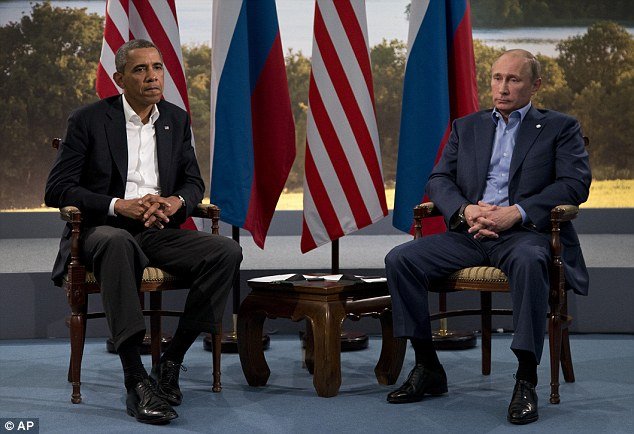
US President Barack Obama and Russian President Vladimir Putin at the G8 summit in Northern Ireland
On Monday, Russian foreign ministry spokesman Alexander Lukashevich said of the possibility of a no-fly zone over Syria: “I think we fundamentally would not allow this scenario.”
The formal talks on Monday covered the global economy.
In their statement after the session, the leaders said prospects remained weak but added that action in the US, Japan and eurozone had helped ease the situation.
“Downside risks in the euro area have abated over the past year, but it remains in recession.
“The US recovery is continuing and the deficit is declining rapidly in the context of a continuing need for further progress towards balanced medium-term fiscal sustainability.”
Ahead of the first session, the US and EU members of the G8 announced that negotiations were to begin on a wide-ranging free-trade deal.
David Cameron, Barack Obama and European Commission President Jose Manuel Barroso held a press conference on the proposed EU-US deal.
The British prime minister said a successful agreement would have a greater impact than all other world trade deals put together.
“This is a once-in-a-generation prize and we are determined to seize it,” said David Cameron.
He said the deal “could add as much as £100 billion [$157 billion; 117 billion euros] to the EU economy, £80 billion to the US economy and as much as £85 billion to the rest of the world”.
Barack Obama said the deal was a priority for the US and he hoped that it would create an economic alliance as strong as the diplomatic and security alliances the two sides enjoyed.
G8 Summit agenda
Monday:
- 15:45: Official arrivals
- 16:45: Global economy
- 18:15: Bilateral meetings
- 20:00: Foreign policy
Tuesday:
- 07:00: Bilateral meetings
- 08:30: Counter-terrorism
- 10:30: Tax transparency
- 14:30: Closing talks
- 15:30: UK PM press conference
- 15:45: Other leaders’ press conferences
(All timings BST)
[youtube vSL8reiterY]
President Vladimir Putin has taken the helm of a new political movement called the Popular Front.
The Russian president was appointed by acclamation as head of the movement in front of a crowd of supporters.
The Front is seen by analysts as a way of strengthening Vladimir Putin’s position as the ruling United Russia party has lost support.
It came as thousands of anti-government protesters marched in Moscow to demand Vladimir Putin’s resignation.
Vladimir Putin told his supporters that he hoped the People’s Front would become a “broad public movement” and that it would help citizens with ideas for improvement see them implemented.
He also said he envisaged the movement as a watchdog that would hold those in power to account, “from the president down to the village mayor”.
The speech was interrupted several times by the crowd chanting “Russia!”, “Putin!” and “ONF!” (the Russian initials of the movement).
After the speech a vote was conducted by Vladimir Putin supporter and film director Stanislav Govorukhin.
“Looks like I am going to ask the stupidest question ever,” Stanislav Govorukhin said.
“Who will we nominate as the leader of our movement?”
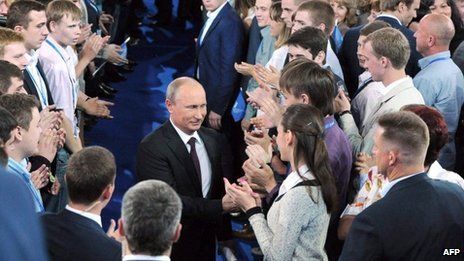
President Vladimir Putin has taken the helm of a new political movement called the Popular Front
The crowd replied by chanting Vladimir Putin’s name.
“Should we vote? Are there any other candidates?” Stanislav Govorukhin asked.
“Vladimir Vladimirovich, congratulations. I feel for you, it is a big burden,” he concluded.
Correspondents say President Vladimir Putin hopes the new movement will shore up his support after corruption allegations that have hit the pro-Putin United Russia party.
In February, United Russia MP Vladimir Pekhtin had to resign his seat in parliament after anti-corruption campaigners accused him of owning homes in the US. Vladimir Pekhtin had been head of the ethics committee in the Duma, parliament’s lower house.
Meanwhile, opposition activists have marched in Moscow to demand the release of prisoners detained over clashes at an anti-government protest last year.
Ten of 12 people being tried over the Bolotnaya case – named after the Moscow square where the clashes occurred in May last year – had their detention extended last week.
Police say protesters taking part in the demonstrations, which began the day before President Vladimir Putin’s swearing-in in May 2012, turned on them with metal bars and flagstones
Opposition leaders say the authorities provoked the clashes.
On Wednesday, several thousand protesters turned out to support the detainees, led by prominent opposition activist Alexei Navalny.
Alexei Navalny is facing trial on charges of embezzling money from a regional timber firm, which he has rejected as politically motivated.
“You can’t sit at home when the government begins repressions against ordinary, decent citizens of our country – people who don’t want to live in this swamp, people who want to see their country thrive,” activist Vitaly Zolomov told the Associated Press.
Gay rights activists also joined the march, denouncing a law passed on Tuesday by the Duma imposing heavy fines for providing information about homos***ality to people under 18.
Vladimir Putin and his wife of 30 years Lyudmila Putina had gone on national television to tell the world their marriage was over.
But it appears many Russians still refusing to believe that a Russian president could even contemplate getting a divorce.
People think that Vladimir Putin, 60, and his 55-year-old wife had responsibilities to the Russian people and to God and could never divorce.
Such disbelief is understandable after all, it’s 300 years since the last time a Russian leader annulled his marriage.
That was Peter the Great, who dispatched his spouse to a nunnery.
Vladimir Putin and Lyudmila Putina interview, during an interval at the ballet, was the strangest affair and came across as highly stage-managed.
Up until this interview, the private life of Vladimir Putin had been taboo for Russia’s state media.
Reporters would never dare to ask the Kremlin leader about his marital problems.
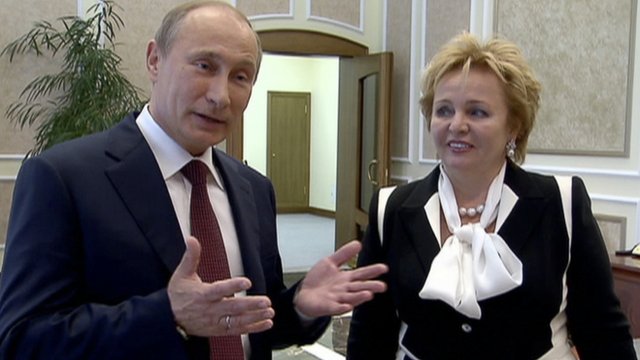
Vladimir Putin and his wife of 30 years Lyudmila Putina had gone on national television to tell the world their marriage was over
On Thursday night, though, a state television correspondent posed the hitherto unthinkable questions: was it true that the president and his wife were living apart? Were they divorced?
It’s hard to believe such uncomfortable quizzing could have gone ahead without official say-so.
The reporter sounded nervous; at one point she apologized for mentioning the D-word – “divorce”.
So why is the marriage over?
Judging from what was said in the interview, it comes down to Vladimir Putin spending too much time at work and Lyudmila Putina’s loathing of being in the public eye. But could there be another reason?
On Moscow radio, Vladimir Putin’s spokesman Dmitry Peskov was asked about “rumors” that another woman had come into the president’s life. Dmitry Peskov denied it, dismissing claims as “gossip, rumors and speculation”.
It’s unclear how the divorce will affect Russia’s perception of their president.
Some Russians will clearly be disappointed that the Kremlin leader is pushing ahead with plans for a divorce.
Yesterday’s edition of Izvestia warns that President Vladimir Putin risks alienating a key section of his supporters – married women.
And yet there has been a degree of sympathy and support for Vladimir Putin in the media and in blogosphere; some Russians praise him for being honest about his private life and his marital problems, and for showing that a Russian president is no demigod: he’s just human, like everyone else.
[youtube 7Q0kkFupnmc]
[youtube dRVrlk3ZKCM]
Former Olympic champion and politician Alina Kabaeva is set to become the future First Lady of Russia, according to recent reports.
Until now, Alina Kabaeva was Russia’s first sweetheart, because from 2008 reportedly she is in a relationship with Vladimir Putin.
Now President Vladimir Putin is officially divorced from his wife Lyudmila Putina and he can live his love with his beautiful lover alina Kabaeva.
So, who is Alina Kabaeva, who drove crazy one of the most powerful man in Europe?
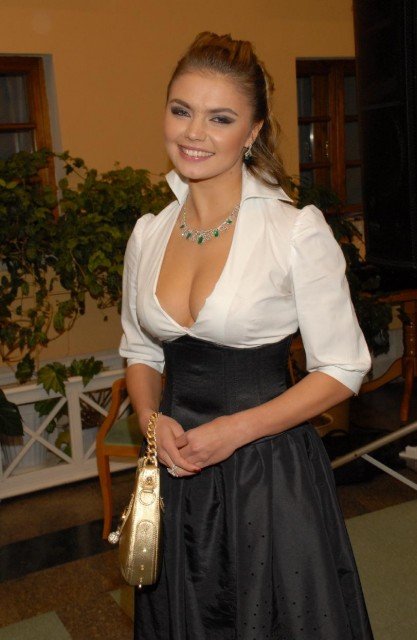
Alina Kabaeva is set to become the future First Lady of Russia
Alina Kabaeva was born in 12 May 1983 in Tashkent, in former Soviet Union’s republic of Uzbekistan and from the beginning showed her love for sports. At the age of 3 she started to play rhythmic gymnastics and soon after showed her talent in it. At 15 she became European champion, as in her career she won 2 Olympic medals, 14 world and 25 European titles.
The daughter of former football star Marat Kabayev, Alina Maratovna Kabaeva retired from the sport in 2007, but showed the world that she won’t stay far from the spotlight. She played in movies, video clips and from the 2007 she is a member of Vladimir Putin’s party – United Russia – managing to enter the Parliament.
In the same year she met Vladimir Putin and they came close. So close that the European press has written quite a few articles about their romance. But this didn’t concern the Russian media, because it is forbidden to all the Russian journalists to refer to their relationship. However, rumours say Vladimir Putin has two children from Alina Kabaeva.
Except for the rhythmic gymnastics, Alina Kabaeva shows great talent in modelling. This has been proven by her photo shoots both in Vogue and Maxim magazines.
[youtube LQUpDguLGTQ]
There are rumors that Russian President Vladimir Putin, who just announced his divorce from his wife of 30 years Lyudmila Putina, and former gymnast Alina Kabaeva have decided to get married.
But who is Vladimir Putin’s potential new bride?
Alina Maratovna Kabaeva was born on May 12, 1983 in Tashkent, Uzbek SSR of former Soviet Union. Her father is former professional football player Marat Kabayev.
Alina Kabaeva is known for her extreme natural flexibility. She stands at 1.66 m (5’4) and weighs 48 kg (106 lbs).
She is Russia’s most successful rhythmic gymnast to date, and is also one of the most decorated gymnasts in the history of rhythmic gymnastics.
Alina Kabaeva started rhythmic gymnastics in Tashkent, Uzbekistan in 1987 at the age of 4. She made her international debut in 1996. In 1998, at age 15, Alina Kabaeva took out the European Championships in Portugal, her victory considered by many to be completely “out of the blue”.
Alina Kabaeva took home a gold medal in rhythmic gymnastics at the 2004 Olympic Games in Athens. She also took a bronze medal at Sydney in 2000.
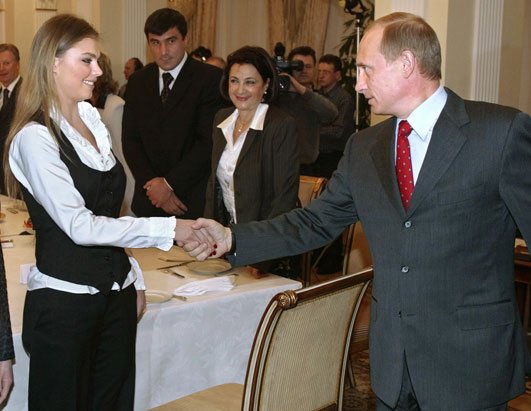
Former gymnast Alina Kabaeva is Vladimir Putin’s potential new bride
In October 2004, Alina Kabaeva announced her retirement from the sport. However, in June 2005, the Russian head coach Irina Viner announced a possible comeback.
Alina Kabaeva resumed her sport career at an Italy-Russia friendly competition in Genoa, on 10 September 2005. On March 5, 2006, she won the Gazprom Moscow Grand Prix, taking the second and third places. She won the silver medal in all-around at the 2006 European Championships.
The gymnast finished 4th in qualifications at the 2007 World Championships and did not advance into the finals due to the two per country rule with Vera Sessina and Olga Kapranova placing ahead of Alina Kabaeva. She completed her career at the 2007 Season.
Since 2005 Alina Kabaeva has been a member of the Public Chamber of Russia.
She also appeared briefly in the 2001 Japanese movie Red Shadow, performing her gymnastic routine. Since 2007, Alina Kabaeva has been a member of the Russian parliament, the State Duma, representing the United Russia party. Since February 2008 she has been Chairman of the National Media Group’s Public Council, the media group that controls Izvestia, Channel One and REN TV.
In January 2011, Alina Kabaeva appeared on the cover of Vogue Russia.
[youtube c8I0t-Cj-Eg]
Vladimir Putin and his wife Lyudmila Putina have announced that they have separated and their marriage is over.
The 60-year-old Russian president and his 55-year-old wife broke the news of the end of the 29-year marriage in an obviously staged TV interview after a night at the ballet that made no mention of Vladimir Putin’s alleged mistress, former Olympic gymnast Alina Kabaeva, 30.
Asked on Rossiya-24 television about longstanding rumors that the Putins no longer lived together, Vladimir Putin said: “That is true.”
Lyudmila Putina said it had been “our common decision. And our marriage is over due to the fact that we barely see each other”.
Asked whether they were divorced, Lyudmila Putina said it was a “civilized divorce”.
But neither clarified whether they were legally divorced and Vladimir Putin’s spokesman, Dmitry Peskov, said he did not know.
The obviously staged interview made no mention of Alina Kabayeva, a 30-year-old former gymnast who is rumored to have been Vladimir Putin’s mistress for years.
Alina Kabaeva, who is alleged to have given birth to Vladimir Putin’s lovechild, is now a politician after retiring from a glittering career in gymnastics in which she represented her country at the Olympics twice.
Rumors about Vladimir Putin’s alleged affair with Alina Kabaeva first surfaced five years ago when a Russian newspaper owned by the oligarch Alexander Lebedev reported that Putin wanted to marry his gymnast mistress.
Vladimir Putin angrily denied the story, and the newspaper was closed down shortly afterwards, which many attributed to Putin’s rage. Further stories later emerged claiming that Alina Kabaeva had had a baby by the president, but both sides denied them.
Vladimir Putin and Lyudmila Putina had last been seen in public together at Putin’s inauguration to his third presidential term on May 7, 2012.
Married just a few weeks short of 30 years, the Putins announced the decision on state television after attending a ballet performance Thursday evening in the Kremlin.
Lyudmila Putina has rarely been seen in public during her husband’s long tenure at the top of Russian politics.
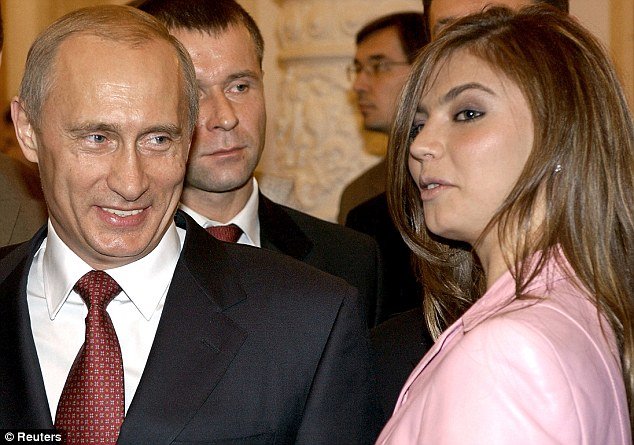
Alina Kabaeva, who is alleged to have given birth to Vladimir Putin’s lovechild, is now a politician after retiring from a glittering career in gymnastics in which she represented Russia at the Olympics twice
“I don’t like publicity and flying is difficult for me,” she said.
In the televised announcement of their divorce, Vladimir Putin appeared reserved and Lyudmila Putina smiled tentatively.
“We practically never saw each other. To each his own life,” Vladimir Putin said.
Lyudmila Putina said: “We will eternally be very close people. I’m thankful … that he supports me.”
There were no immediate indications of how the move would be perceived by the public. Divorce is common in Russia, and nearly 700,000 pairs dissolved their marriages in 2009, according to UNICEF.
Russian leaders, unlike their counterparts in the West, generally keep their personal lives well out of public view. Mikhail Gorbachev’s wife Raisa raised many Russians’ hackles by her visibility, flair for fashionable dress and forthright comments.
But Vladimir Putin also has made a point of supporting traditional social values and appearing at holiday masses of the Orthodox Church.
The church permits divorce under some circumstances; it is not clear if the Putins sought pastoral advice or permission before the split.
The couple, who married in 1983 and have two daughters, recently attracted attention after they were never seen in public together.
An official family portrait has been issued, and photographs of their daughters Maria, 27, and Yekaterina, 26, have never been printed by the Russian media.
In April speculation was mounting as to why the first lady of Russia was rarely seen by the president’s side.
Unfounded rumors suggested Vladimir Putin had an affair with spy-turned-lingerie model Anna Chapman, which has been strongly denied, was behind the former Aeroflot-hostess’ disappearance from public view.
In October 2010 the Putins tried to quell rumors they had divorced by posing for pictures as they jointly answered questions for the national census.
Vladimir Putin has been a constant fixture in leading the country.
He was re-elected to the role of President in May last year, and he previously held the post from 2000 to 2008.
In between his these offices, Vladimir Putin was Prime Minister of Russia from 1999 to 2000 and again from 2008 to 2012.
The Russian office of first lady demands the attendance of many official ceremonies and functions of state – either by the side of the president or to represent him.
Russia heavily frowns upon the First Lady holding outside employment while occupying the office.
[youtube hmJ5WLblDu4]
[youtube qLXqCmUyui0]
Vladimir Putin and his wife Lyudmila Putina have announced their marriage is over.
The Russian president and his wife, who had been married for 30 years, made their divorce public on Russian state television after attending a ballet performance.
“It was a joint decision: we hardly see each other, each of us has our own life”, Vladimir Putin said.
Lyudmila Aleksandrovna Putina had rarely been seen in public in recent months, prompting much speculation in Russian media.
She is known to dislike publicity, and told the TV reporter that flying was difficult for her.
The divorce was “civilized” and the couple would “always remain close”, she said.
“I am very grateful to Vladimir… that he still supports me. And the children, he really cares for them and the children feel this,” Lyudmila Putina added.
Vladimir Putin confirmed on TV that the two were no longer living together.
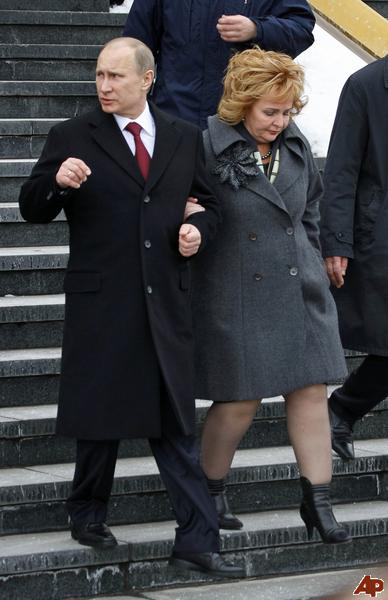
Vladimir Putin and his wife Lyudmila Putina have announced their marriage is over
Vladimir Putin and Lyudmila Shkrebneva were married in 1983. They have two daughters, Maria and Yekaterina, both in their 20s.
“Our children have grown up; they have their own lives,” Lyudmila Putina added.
She and Vladimir Putin were last seen together at his inauguration for his third term as president on 7 May 2012.
Neither clarified whether or not their marriage had been legally dissolved.
Vladimir Putin’s spokesman, Dmitry Peskov, said: “They separated a long time ago. I don’t know if the divorce has been formalized but I can confirm that we are talking about a civilized divorce.”
The announcement came after the couple had gone to see the ballet Esmeralda at the Kremlin Palace – they left after the first act.
Thursday’s announcement confirms what had been rumored for years, that the Putins were having marital problems.
But the news has still come as a shock to many Russians, who are not used to their leaders getting divorced.
The Putins’ marriage has been the subject of speculation before.
In 2008, Vladimir Putin denied rumors that he had secretly divorced and was planning to remarry former Olympic gymnast Alina Kabayeva.
[youtube 7Q0kkFupnmc]
Russia and the United States have agreed to work towards holding an international conference to find a political solution to the conflict in Syria.
Foreign Minister Sergei Lavrov and Secretary of State John Kerry announced it would follow on from an Action Group for Syria meeting in Geneva last June.
John Kerry said they would try to “bring both sides to the table”.
Relations between Moscow and Washington have been strained in the last two years by differences over Syria.
John Kerry held lengthy talks with Russian President Vladimir Putin on Tuesday during his first visit to Moscow since becoming secretary of state.
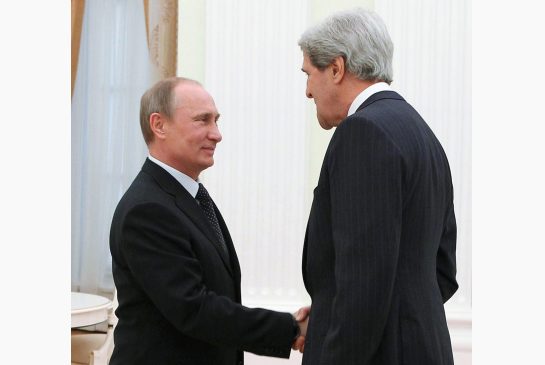
John Kerry held lengthy talks with Russian President Vladimir Putin on Tuesday during his first visit to Moscow since becoming secretary of state
He told Vladimir Putin that their two countries shared “some very significant common interests with respect to Syria”, including “stability in the region” and “not letting extremists create problems”.
“It is my hope that today we will be able to dig into that a little bit, and see if we can find common ground,” he added.
John Kerry then held further discussions with Sergei Lavrov, after which they jointly announced that they would try to organize an international conference on ending the conflict in Syria, if possible before the end of May.
It will try to convince both the Syrian government and opposition to accept a solution based on the core elements of the final communiqué issued on 30 June 2012, after the UN-backed Action Group for Syria meeting in Geneva.
The communiqué called for an immediate cessation of violence and the establishment of a transitional government that could include officials serving under Syrian President Bashar al-Assad and members of the opposition.
“We believe that the Geneva communiqué is the important track to end the bloodshed in Syria,” John Kerry told a news conference.
He added that a negotiated settlement would help avert the danger of Syria breaking up and might influence Washington’s decision on whether or not to arm rebel groups.
Sergei Lavrov reaffirmed Moscow’s belief that the departure of President Bashar al-Assad should not be a condition for peace talks, but insisted he was not trying to keep him in power.
“We are not concerned by the fate of any individual. We are concerned by the fate of the Syrian people,” Sergei Lavrov said.
[youtube SYLhCFUKO_Q]
Russia has decided to publish a list of 18 US officials barred from the country, in response to a similar list published by the US Treasury on Friday.
A Russian statement described the US move as a severe blow to relations, and said blackmail could not be ignored.
The US published its list under an act – Magnitsky Sanctions Listings – named after Russian lawyer Sergei Magnitsky who died in jail in 2009 in disputed circumstances.
The list includes officials who jailed Sergei Magnitsky after he accused them of corruption.
Senior officials from President Vladimir Putin’s entourage who had been expected to be included were left off, including Russia’s top police official Alexander Bastrykin.
Russia’s list, announced by the foreign ministry, includes two former Bush administration officials who are said to have advocated harsh interrogation techniques and two former commanders of the detention centre at Guantanamo Bay.
David Addington, chief of staff to former Vice-President Dick Cheney is one of them.
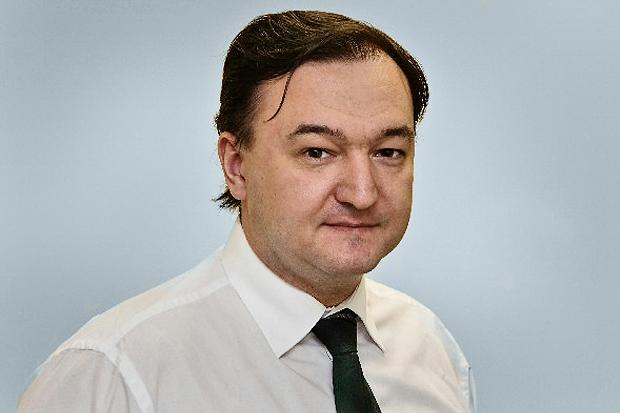
Sergei Magnitsky was arrested in 2008 for tax evasion after accusing Russian police officials of stealing $230 million from the state
The other 14 were named as having violated the rights of Russian citizens abroad.
“The war of lists is not our choice, but we cannot ignore outright blackmail,” a statement from the Russian ministry said.
“It’s time for Washington politicians to finally understand that there are no prospects in building relations with a country like Russia with the spirit of mentoring and undisguised dictating.”
Russia’s Itar-Tass news agency quoted Deputy Foreign Minister Sergei Ryabkov as saying there was also a secret section to the list with more names, as the US list had.
A Russian law barring Americans from adopting Russian orphans, regarded as a response to the US law, has already been passed.
The final US list published on Friday included people born in Russia, Ukraine, Azerbaijan and Uzbekistan, 16 of them linked to the Magnitsky case. Some 250 names had originally been put forward by US politicians.
The others are officials deemed to have participated in recent Kremlin moves to restrict Russians’ political rights.
Sergei Magnitsky was arrested in 2008 for tax evasion after accusing Russian police officials of stealing $230 million from the state through fraudulent tax rebates. His family and rights groups say he was badly beaten and denied medical treatment in custody.
The Magnitsky Act passed by Washington in 2012 blacklists Russian officials accused of involvement in his death. All the names on the list had until Friday been kept secret.
Those affected by the American measures have had their US accounts frozen and have been added to a list of people who will be denied US entry visas. Some European nations are taking similar measures.
Correspondents say that the argument threatens to cast a shadow over a visit to Russia by President Barack Obama’s National Security adviser Tom Donilon, who is to hold high-level talks in Moscow on Monday.
The posthumous trial of Sergei Magnitsky – who died in 2009 aged 37 in pre-trial detention after developing pancreatitis – opened in Moscow in March but was adjourned shortly afterwards.
Legal experts say they are unaware of any precedents for the trial of a dead man in Russian history.
[youtube ZuGez-5IIKM]
[youtube POx-p7JuEIw]
Russian President Vladimir Putin and German Chancellor Angela Merkel were confronted by Femen activists in Hanover, Germany.
Femen activists, who strip off to highlight a range of issues, including women’s rights, press freedom and domestic violence were dragged kicking and screaming from the premises by security guards.
As one women tried to push through to Vladimir Putin she was blocked by his aides – her back was painted with words directed against the Russian president.
The members of the women’s rights group Femen, which has staged protests against Russia’s detention of the feminist punk band Pussy Riot around Europe, appeared as Vladimir Putin visited a trade fair in Hanover with Angela Merkel.

Vladimir Putin and Angela Merkel were confronted by topless Femen activists in Hanover
They stripped off to the waist and shouted slogans calling Vladimir Putin a “dictator” before being covered up and bundled away by security men.
However, a smiling Vladimir Putin shrugged off the protest and said: “As for the action, I liked it.”
“You should be grateful to the girls, they are helping you make the fair more popular.”
But Angela Merkel was not amused, saying: “Whether one has to resort to such an emergency measure in Germany and can’t say one’s piece some other way, I have my doubts.”
It seems that the Kremlin were not so impressed by the demonstration as Vladimir Putin.
“This is ordinary hooliganism and unfortunately it happens all over the world, in any city. One needs to punish [them],” said Kremlin spokesman Dmitry Peskov.
Vladimir Putin’s arrival at the trade fair on Sunday also drew protesters, some of whom were dressed in striped prison uniforms.
“Stop political terror,” read one banner.
Angela Merkel told Vladimir Putin in a speech at the fair on Sunday that Russia needed “an active civil society” including freedom for non-governmental organizations, after a wave of controversial state inspections of foreign-funded NGOs in Russia.
The German chancellor had promised to raise what she called “controversial subjects” with the Russian leader, after coming under pressure to voice Berlin’s unease over the crackdown on NGOs, Moscow’s support of the Syrian government and its criticism of the German-orchestrated financial bailout of Cyprus.
Femen was founded in Kiev in 2008 to protest against Ukraine’s booming sex industry. At their first demonstration members appeared clothed carrying banners reading “Ukraine is not a brothel!”.
Femen has since gone from strength to strength with 150,000 members worldwide and branches across Europe and even in highly conservative countries such as Egypt.
Former Dire Straits frontman Mark Knopfler has decided to cancel two concerts in Russia in protest over what he called the country’s “crackdown” on human rights groups.
Mark Knopfler pulled out of Moscow and St Petersburg concerts in June after Russian authorities searched the offices of organizations including Human Rights Watch and Amnesty International.
Critics say the raids are an attempt to crush government dissent.
“I hope the current climate will change soon,” the singer wrote on his website.
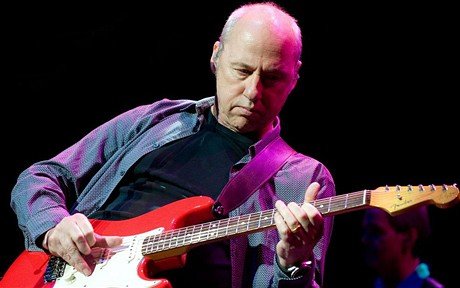
Mark Knopfler pulled out of Moscow and St Petersburg concerts in June after Russian authorities searched the offices of organizations including Human Rights Watch and Amnesty International
Mark Knopfler’s statement said: “Given the crackdown by Russian authorities… I have regretfully decided to cancel my upcoming concerts in Moscow and St Petersburg.
“I have always loved playing in Russia and have great affection for the country and the people.”
His decision was backed by opponents of President Vladimir Putin, whose United Russia Party passed a bill in November requiring all non-governmental organizations (NGOs) engaging in political activity and receiving overseas funding to register as “foreign agents”.
Anti-government blogger Anton Nosik wrote: “I don’t just understand Knopfler’s decision. I respect it.”
More than 100 NGOs are said to have been searched in recent weeks.
Last month, human rights watchdog Agora said it had been swamped with calls from NGOs complaining about visits by officials from the prosecutor-general’s office, the justice ministry and tax officials.
Russian authorities claim the searches are routine but Pavel Chikov, a member of the Russian presidential Human Rights Council, said up to 2,000 organizations had been targeted with inspections and searches last month, in connection with the NGO law.
“It goes full circle across the whole spectrum – they’re trying to find as many violations as possible,” Pavel Chikov added.
President Vladimir Putin has ordered surprise military exercises in the Russian Black Sea region, to test the armed forces’ battle readiness.
Vladimir Putin’s spokesman said the exercises would involve 36 ships and up to 7,000 troops.
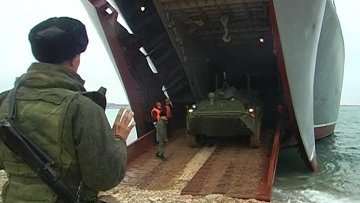
Vladimir Putin has ordered surprise military exercises in the Russian Black Sea region, to test the armed forces’ battle readiness
He added that Russia was not obliged to give warning of exercises involving fewer than 7,000 personnel.
Russia moved to reform its military after the 2008 war with Georgia showed up weaknesses.
[youtube sCb8xMPCz6A]
British police with expertise in environments contaminated with chemical, biological and nuclear material are searching the house of the late exiled Russian tycoon Boris Berezovsky.
Boris Berezovsky, 67, was found dead on Saturday, and a Thames Valley police cordon remains in place as police investigate his unexplained death.
His body remains at the Berkshire house while the search – described as a precaution – takes place, police said.
They say local people are not at risk.
The ambulance service was called to the Ascot house of Boris Berezovsky at 15:18 GMT on Saturday. His body was reportedly found in a bath.
A Thames Valley police update said: “Specially trained officers are currently at the scene, including CBRN [chemical, biological, radiological, and nuclear] trained officers, who are conducting a number of searches as a precaution.
“This is to enable officers to carry out an investigation into the man’s death.”

British police with expertise in environments contaminated with chemical, biological and nuclear material are searching the house of the late exiled Russian tycoon Boris Berezovsky
Supt Stuart Greenfield said: “We are aware the cordon is causing disruption to local residents and we apologize for any inconvenience, but it is important we take all necessary measures to ensure a full and thorough investigation can be carried out.
“I would like to reassure residents that we are confident there is no risk to the wider community.”
He said the property was part of a large estate, so a number of roads were closed “and will remain so for the time being”.
Boris Berezovsky was a wanted man in Russia, an opponent of President Vladimir Putin, and had survived numerous assassination attempts, including a bomb that decapitated his chauffeur. He emigrated to the UK in 2000.
The Russian tycoon was a close friend of murdered Russian émigré and former KGB officer Alexander Litvinenko, who died in 2006 after he was poisoned with the radioactive material polonium-210 while drinking tea at a London meeting.
Without naming Boris Berezovsky, the Kremlin has accused its foreign-based opponents of organizing the assassination – a claim Boris Berezovsky denied. He accused Vladimir Putin of being behind the death.
In the interview with a journalist from Forbes magazine on Friday, Boris Berezovsky said that he had changed his mind on many things, his life no longer made sense and he wished he could return to Russia.
Last night a Kremlin spokesman said that Boris Berezovsky had recently written to Vladimir Putin, saying he wanted to go home.
Boris Berezovsky’s wealth is thought to have considerably diminished in recent years, leaving him struggling to pay debts in the wake of costly court cases.
Last year, Boris Berezovsky lost a £3 billion ($4.7 billion) damages claim against Chelsea Football Club owner Roman Abramovich.
[youtube LqdvrQ_RqqY]
Exiled Russian tycoon Boris Berezovsky has been found dead at his home outside London on March 23.
Boris Berezovsky, who died at the age of 67, was a Russian dissident and a former Kremlin power broker whose fortunes went into dramatic decline as Vladimir Putin established himself as the country’s president.
He played a role in Vladimir Putin’s rise in the late 1990s, but went into opposition and then self-imposed exile as the new president consolidated his power.
Boris Berezovsky remained a wanted man in Russia until his death, and was for a long time dedicated to the anti-Putin cause.
In recent years, Boris Berezovsky’s wealth is thought to have considerably diminished and recent court cases have left him struggling to pay legal fees and other debts.
In 2012 a court battle in London with fellow “oligarch” Roman Abramovich, his former associate with whom he fell out as Vladimir Putin came to power, ended in defeat, with his allegations that he was intimidated by Abramovich into selling shares in Russian oil giant Sibneft for a “fraction of their true worth” entirely rejected by the judge.
And earlier this year, his ex-partner Yelena Gorbunova alleged in the High Court that he owed her millions of pounds from the sale of a £25 million ($39 million) property in Surrey, UK.
On March 18, The Times newspaper reported that Boris Berezovsky had been forced to try to sell a painting by Andy Warhol of the former Soviet leader Vladimir Lenin.
The role of political plotter, and financier of Russian opposition parties, was the latest in a series of reincarnations that Boris Berezovsky went through in his 67 years.
His first career was as a mathematician, his second as a car salesman, his third as a political kingmaker, nicknamed Rasputin, under Russia’s first president Boris Yeltsin.
Boris Berezovsky made his fortune importing Mercedes cars into Russia in the 1990s, and setting himself up as a middleman distributing cars made by Russia’s Avtovaz.
While Avtovaz struggled to survive, Boris Berezovsky nevertheless made millions.
By the mid-1990s, he was one of Russia’s leading oligarchs, a word used for those who made their fortunes during the wholesale privatization of state assets.
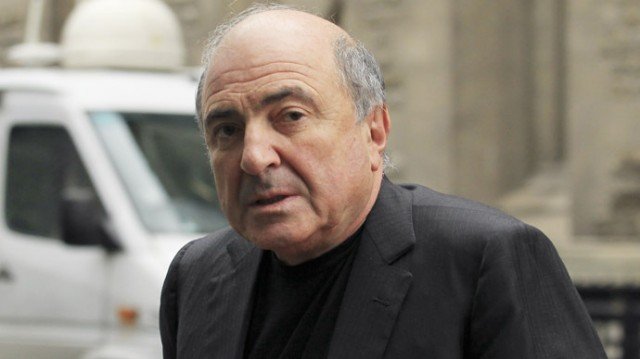
Exiled Russian tycoon Boris Berezovsky has been found dead at his home outside London on March 23
As well as taking ownership of the Sibneft oil company, Boris Berezovsky became the main shareholder in the country’s main television channel, ORT, which he turned into a propaganda vehicle for Boris Yeltsin in the run-up to the 1996 presidential election.
Boris Berezovsky has survived numerous assassination attempts, including a bomb that decapitated his chauffeur.
He took Forbes magazine to court for describing him as the “godfather of the Kremlin” and linking him to the murder of a popular television journalist.
Forbes settled out of court, accepting that the allegations were false.
Boris Berezovsky was at the height of his power in the later Yeltsin years, when he was deputy secretary of Russia’s security council, a friend of Boris Yeltsin’s daughter Tatyana, and a member of the Yeltsin inner circle, or “family”.
Although he helped Vladimir Putin enter the family, and funded the party that formed Putin’s parliamentary base, the new president moved to regain control of the ORT television station, and to curb the political ambitions of Russia’s oligarchs.
Boris Berezovsky left Russia for self-imposed exile in the UK at the end of 2000.
An early attempt to promote opposition to Vladimir Putin, by funding the Liberal Russia party, ended in disaster when its two most prominent members were assassinated.
“I understood [then] that this way of open opposition doesn’t work, at least for me. And that’s the reason why I decided to choose the other way,” he later said.
Without naming Boris Berezovsky, the Kremlin accused its foreign-based opponents of organizing the 2006 assassinations of former KGB agent Alexander Litvinenko and the campaigning journalist Anna Politkovskaya, in order to discredit Vladimir Putin.
Boris Berezovsky denied the allegation, and accused Vladimir Putin of himself being behind Alexander Litvinenko’s death.
Boris Berezovsky bought the ex-spy – himself in exile in London – a house in Muswell Hill and helped him to publicize claims that Vladimir Putin organized the bombings of apartment blocks in Russia, in 1999, which paved the way for Russia’s second military intervention in Chechnya.
He said Vladimir Putin was prepared to kill anyone that he defined as an enemy of Russia, and that he himself was a target.
That is why the mansion Boris Berezovsky bought for £10 million ($15 million) from former disc jockey Chris Evans was equipped with bullet-proof windows, laser monitors, spy cameras and reinforced steel doors.
[youtube cTzE5aLGHHE]
 Prev1...111213...14Next
Prev1...111213...14Next  Page 12 of 14
Page 12 of 14

























